NURBN2009 Essay: Health Promotion, Ottawa Charter, and Empowerment
VerifiedAdded on 2023/04/20
|10
|2788
|268
Essay
AI Summary
This essay discusses health promotion and health education, emphasizing their role in preventive treatments and empowering individuals. It uses the Ottawa Charter as a health promotion framework, focusing on building healthy public policy, creating supportive environments, strengthening community actions, developing personal skills, and reorienting health services. The essay addresses stress among university students, highlighting the negative impacts of stress on health and behaviors. It explains how the Ottawa Charter can be applied to design a health promotion program to help students manage stress effectively through policy changes, supportive environments in universities, community support systems, skill development, and reorientation of health services in healthcare organizations. The role of health literacy in empowering individuals to make informed health decisions is also emphasized.
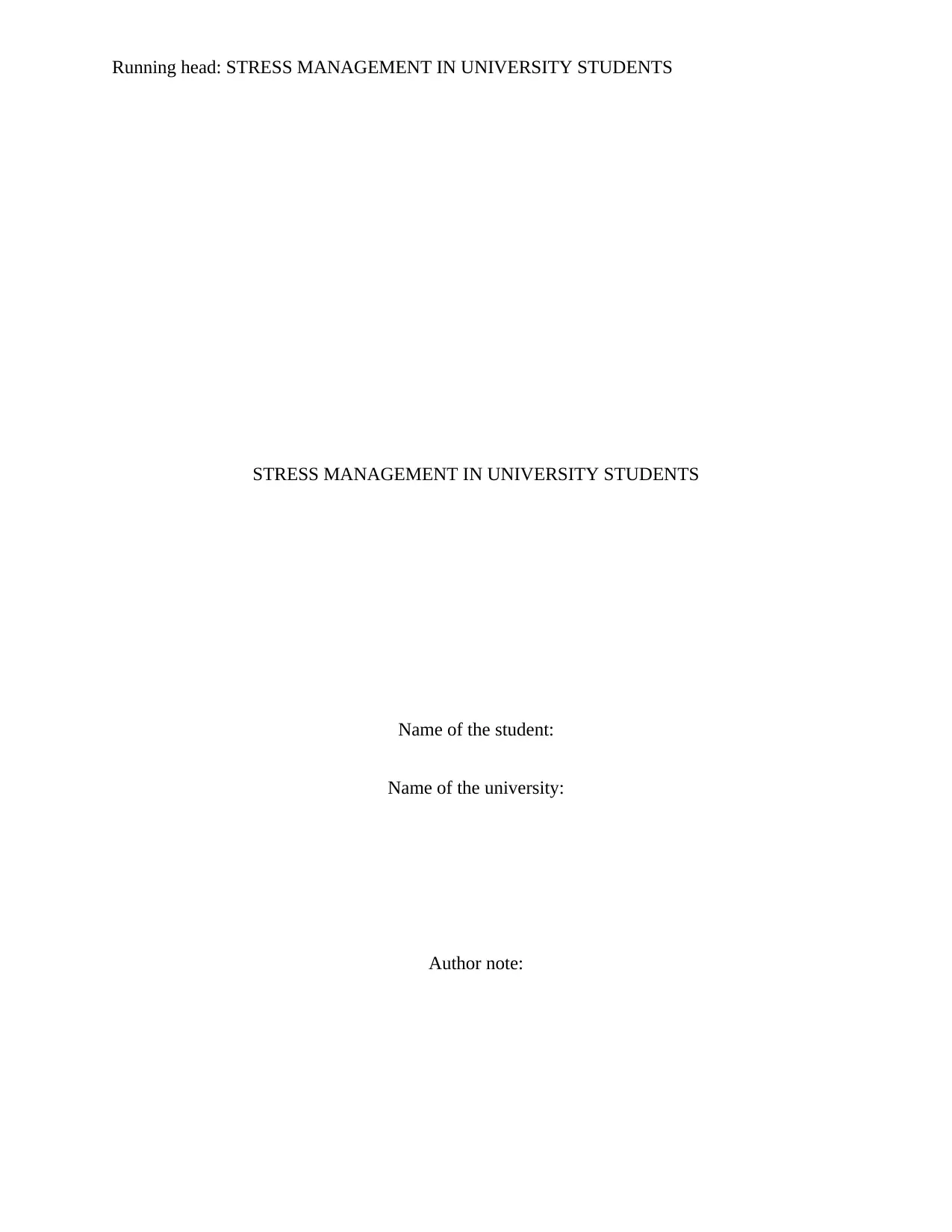
Running head: STRESS MANAGEMENT IN UNIVERSITY STUDENTS
STRESS MANAGEMENT IN UNIVERSITY STUDENTS
Name of the student:
Name of the university:
Author note:
STRESS MANAGEMENT IN UNIVERSITY STUDENTS
Name of the student:
Name of the university:
Author note:
Paraphrase This Document
Need a fresh take? Get an instant paraphrase of this document with our AI Paraphraser
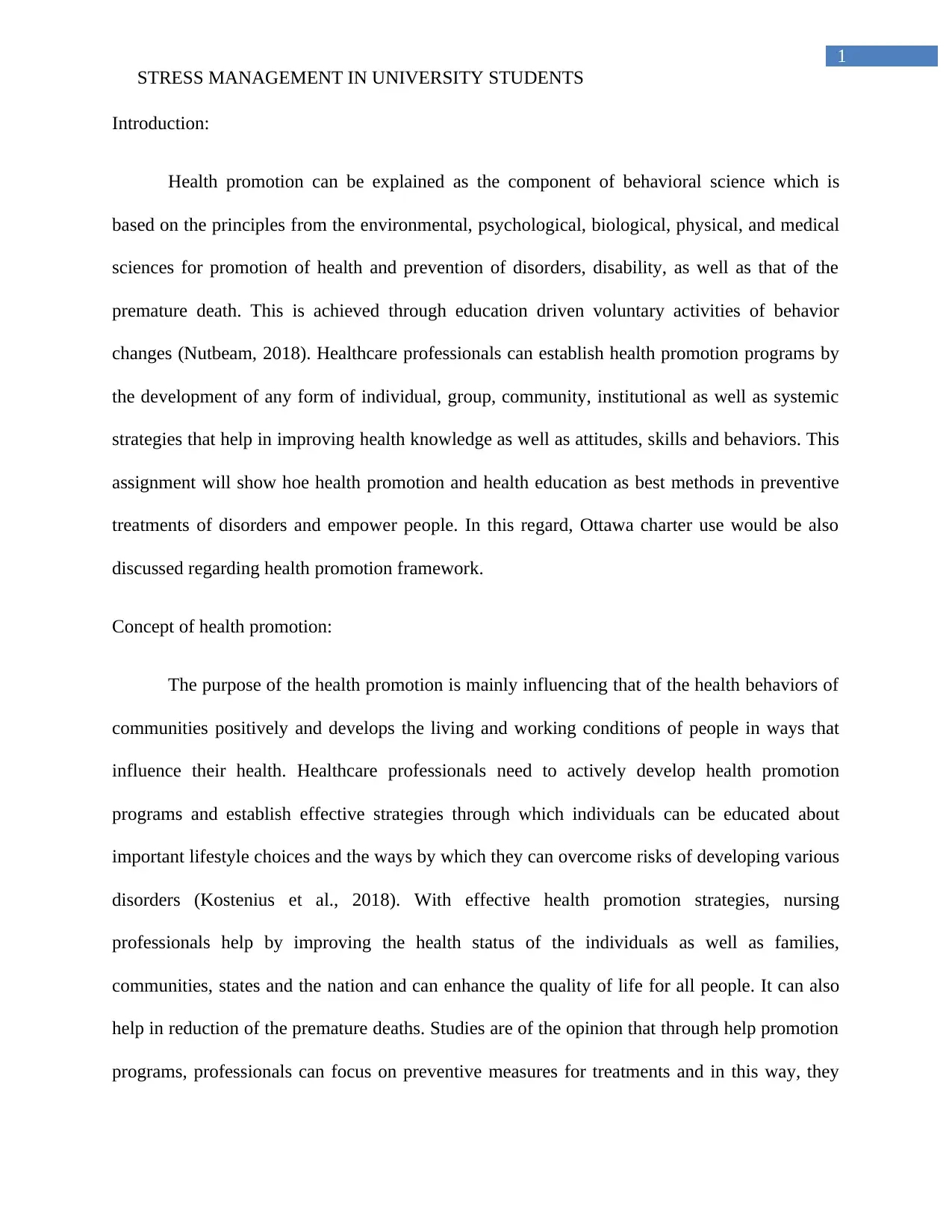
1
STRESS MANAGEMENT IN UNIVERSITY STUDENTS
Introduction:
Health promotion can be explained as the component of behavioral science which is
based on the principles from the environmental, psychological, biological, physical, and medical
sciences for promotion of health and prevention of disorders, disability, as well as that of the
premature death. This is achieved through education driven voluntary activities of behavior
changes (Nutbeam, 2018). Healthcare professionals can establish health promotion programs by
the development of any form of individual, group, community, institutional as well as systemic
strategies that help in improving health knowledge as well as attitudes, skills and behaviors. This
assignment will show hoe health promotion and health education as best methods in preventive
treatments of disorders and empower people. In this regard, Ottawa charter use would be also
discussed regarding health promotion framework.
Concept of health promotion:
The purpose of the health promotion is mainly influencing that of the health behaviors of
communities positively and develops the living and working conditions of people in ways that
influence their health. Healthcare professionals need to actively develop health promotion
programs and establish effective strategies through which individuals can be educated about
important lifestyle choices and the ways by which they can overcome risks of developing various
disorders (Kostenius et al., 2018). With effective health promotion strategies, nursing
professionals help by improving the health status of the individuals as well as families,
communities, states and the nation and can enhance the quality of life for all people. It can also
help in reduction of the premature deaths. Studies are of the opinion that through help promotion
programs, professionals can focus on preventive measures for treatments and in this way, they
STRESS MANAGEMENT IN UNIVERSITY STUDENTS
Introduction:
Health promotion can be explained as the component of behavioral science which is
based on the principles from the environmental, psychological, biological, physical, and medical
sciences for promotion of health and prevention of disorders, disability, as well as that of the
premature death. This is achieved through education driven voluntary activities of behavior
changes (Nutbeam, 2018). Healthcare professionals can establish health promotion programs by
the development of any form of individual, group, community, institutional as well as systemic
strategies that help in improving health knowledge as well as attitudes, skills and behaviors. This
assignment will show hoe health promotion and health education as best methods in preventive
treatments of disorders and empower people. In this regard, Ottawa charter use would be also
discussed regarding health promotion framework.
Concept of health promotion:
The purpose of the health promotion is mainly influencing that of the health behaviors of
communities positively and develops the living and working conditions of people in ways that
influence their health. Healthcare professionals need to actively develop health promotion
programs and establish effective strategies through which individuals can be educated about
important lifestyle choices and the ways by which they can overcome risks of developing various
disorders (Kostenius et al., 2018). With effective health promotion strategies, nursing
professionals help by improving the health status of the individuals as well as families,
communities, states and the nation and can enhance the quality of life for all people. It can also
help in reduction of the premature deaths. Studies are of the opinion that through help promotion
programs, professionals can focus on preventive measures for treatments and in this way, they
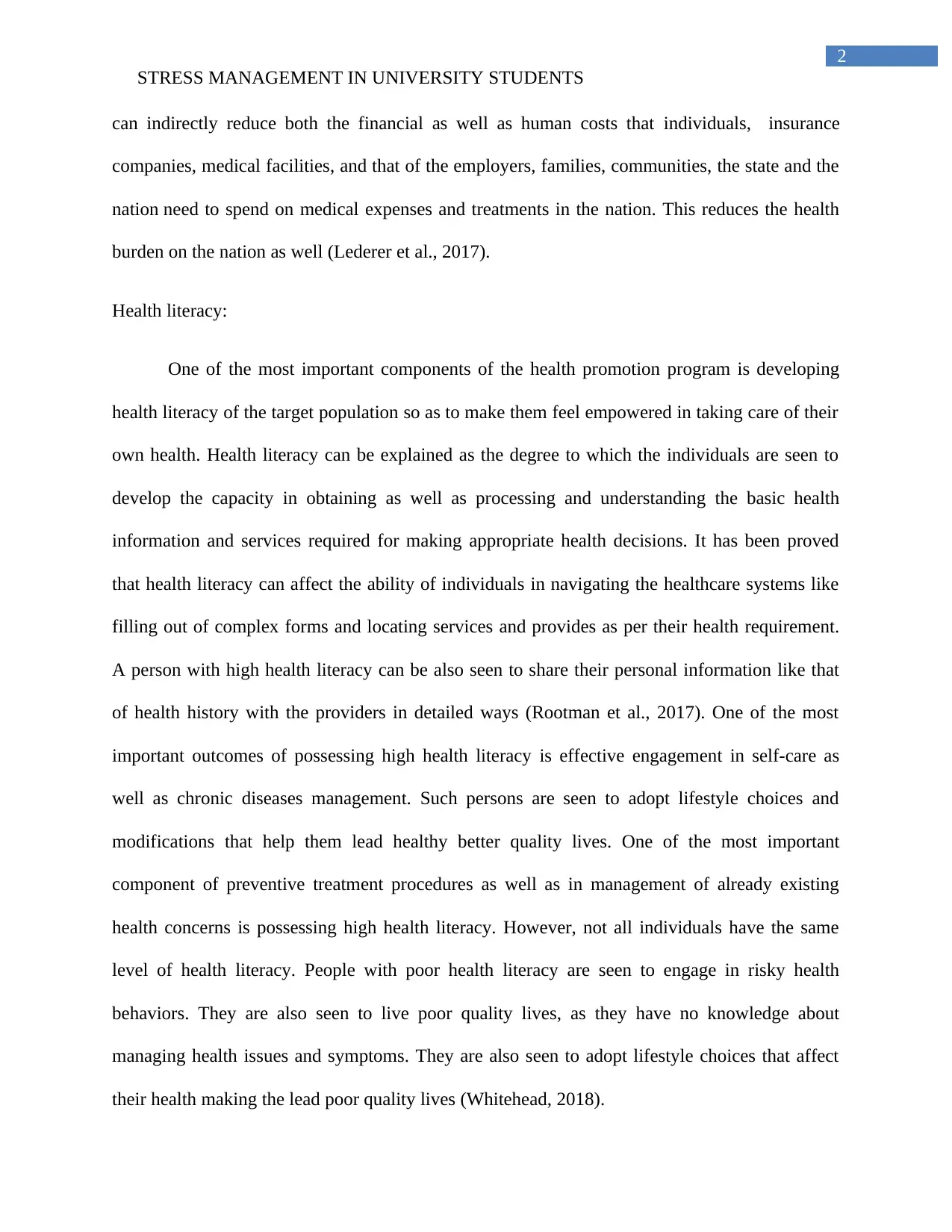
2
STRESS MANAGEMENT IN UNIVERSITY STUDENTS
can indirectly reduce both the financial as well as human costs that individuals, insurance
companies, medical facilities, and that of the employers, families, communities, the state and the
nation need to spend on medical expenses and treatments in the nation. This reduces the health
burden on the nation as well (Lederer et al., 2017).
Health literacy:
One of the most important components of the health promotion program is developing
health literacy of the target population so as to make them feel empowered in taking care of their
own health. Health literacy can be explained as the degree to which the individuals are seen to
develop the capacity in obtaining as well as processing and understanding the basic health
information and services required for making appropriate health decisions. It has been proved
that health literacy can affect the ability of individuals in navigating the healthcare systems like
filling out of complex forms and locating services and provides as per their health requirement.
A person with high health literacy can be also seen to share their personal information like that
of health history with the providers in detailed ways (Rootman et al., 2017). One of the most
important outcomes of possessing high health literacy is effective engagement in self-care as
well as chronic diseases management. Such persons are seen to adopt lifestyle choices and
modifications that help them lead healthy better quality lives. One of the most important
component of preventive treatment procedures as well as in management of already existing
health concerns is possessing high health literacy. However, not all individuals have the same
level of health literacy. People with poor health literacy are seen to engage in risky health
behaviors. They are also seen to live poor quality lives, as they have no knowledge about
managing health issues and symptoms. They are also seen to adopt lifestyle choices that affect
their health making the lead poor quality lives (Whitehead, 2018).
STRESS MANAGEMENT IN UNIVERSITY STUDENTS
can indirectly reduce both the financial as well as human costs that individuals, insurance
companies, medical facilities, and that of the employers, families, communities, the state and the
nation need to spend on medical expenses and treatments in the nation. This reduces the health
burden on the nation as well (Lederer et al., 2017).
Health literacy:
One of the most important components of the health promotion program is developing
health literacy of the target population so as to make them feel empowered in taking care of their
own health. Health literacy can be explained as the degree to which the individuals are seen to
develop the capacity in obtaining as well as processing and understanding the basic health
information and services required for making appropriate health decisions. It has been proved
that health literacy can affect the ability of individuals in navigating the healthcare systems like
filling out of complex forms and locating services and provides as per their health requirement.
A person with high health literacy can be also seen to share their personal information like that
of health history with the providers in detailed ways (Rootman et al., 2017). One of the most
important outcomes of possessing high health literacy is effective engagement in self-care as
well as chronic diseases management. Such persons are seen to adopt lifestyle choices and
modifications that help them lead healthy better quality lives. One of the most important
component of preventive treatment procedures as well as in management of already existing
health concerns is possessing high health literacy. However, not all individuals have the same
level of health literacy. People with poor health literacy are seen to engage in risky health
behaviors. They are also seen to live poor quality lives, as they have no knowledge about
managing health issues and symptoms. They are also seen to adopt lifestyle choices that affect
their health making the lead poor quality lives (Whitehead, 2018).
⊘ This is a preview!⊘
Do you want full access?
Subscribe today to unlock all pages.

Trusted by 1+ million students worldwide
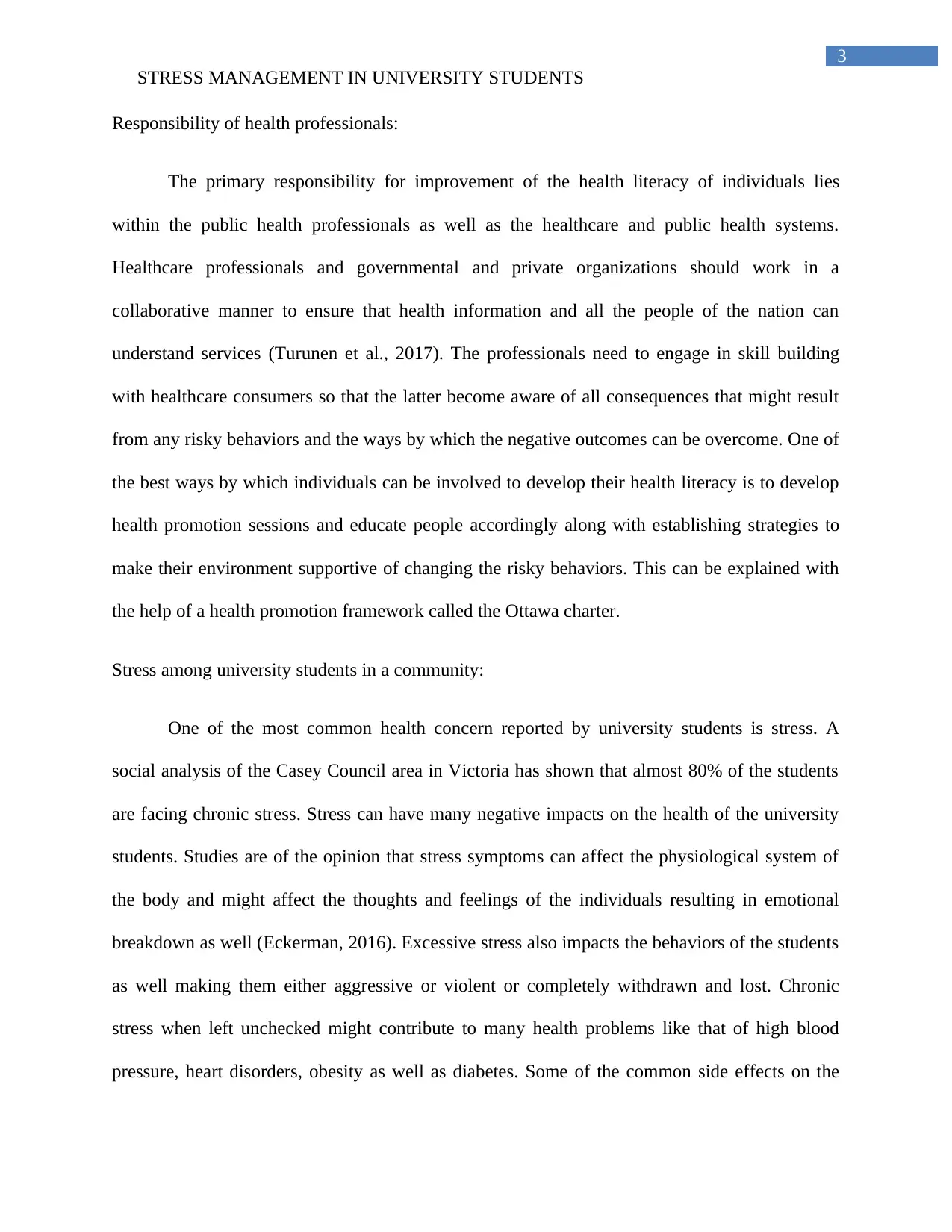
3
STRESS MANAGEMENT IN UNIVERSITY STUDENTS
Responsibility of health professionals:
The primary responsibility for improvement of the health literacy of individuals lies
within the public health professionals as well as the healthcare and public health systems.
Healthcare professionals and governmental and private organizations should work in a
collaborative manner to ensure that health information and all the people of the nation can
understand services (Turunen et al., 2017). The professionals need to engage in skill building
with healthcare consumers so that the latter become aware of all consequences that might result
from any risky behaviors and the ways by which the negative outcomes can be overcome. One of
the best ways by which individuals can be involved to develop their health literacy is to develop
health promotion sessions and educate people accordingly along with establishing strategies to
make their environment supportive of changing the risky behaviors. This can be explained with
the help of a health promotion framework called the Ottawa charter.
Stress among university students in a community:
One of the most common health concern reported by university students is stress. A
social analysis of the Casey Council area in Victoria has shown that almost 80% of the students
are facing chronic stress. Stress can have many negative impacts on the health of the university
students. Studies are of the opinion that stress symptoms can affect the physiological system of
the body and might affect the thoughts and feelings of the individuals resulting in emotional
breakdown as well (Eckerman, 2016). Excessive stress also impacts the behaviors of the students
as well making them either aggressive or violent or completely withdrawn and lost. Chronic
stress when left unchecked might contribute to many health problems like that of high blood
pressure, heart disorders, obesity as well as diabetes. Some of the common side effects on the
STRESS MANAGEMENT IN UNIVERSITY STUDENTS
Responsibility of health professionals:
The primary responsibility for improvement of the health literacy of individuals lies
within the public health professionals as well as the healthcare and public health systems.
Healthcare professionals and governmental and private organizations should work in a
collaborative manner to ensure that health information and all the people of the nation can
understand services (Turunen et al., 2017). The professionals need to engage in skill building
with healthcare consumers so that the latter become aware of all consequences that might result
from any risky behaviors and the ways by which the negative outcomes can be overcome. One of
the best ways by which individuals can be involved to develop their health literacy is to develop
health promotion sessions and educate people accordingly along with establishing strategies to
make their environment supportive of changing the risky behaviors. This can be explained with
the help of a health promotion framework called the Ottawa charter.
Stress among university students in a community:
One of the most common health concern reported by university students is stress. A
social analysis of the Casey Council area in Victoria has shown that almost 80% of the students
are facing chronic stress. Stress can have many negative impacts on the health of the university
students. Studies are of the opinion that stress symptoms can affect the physiological system of
the body and might affect the thoughts and feelings of the individuals resulting in emotional
breakdown as well (Eckerman, 2016). Excessive stress also impacts the behaviors of the students
as well making them either aggressive or violent or completely withdrawn and lost. Chronic
stress when left unchecked might contribute to many health problems like that of high blood
pressure, heart disorders, obesity as well as diabetes. Some of the common side effects on the
Paraphrase This Document
Need a fresh take? Get an instant paraphrase of this document with our AI Paraphraser
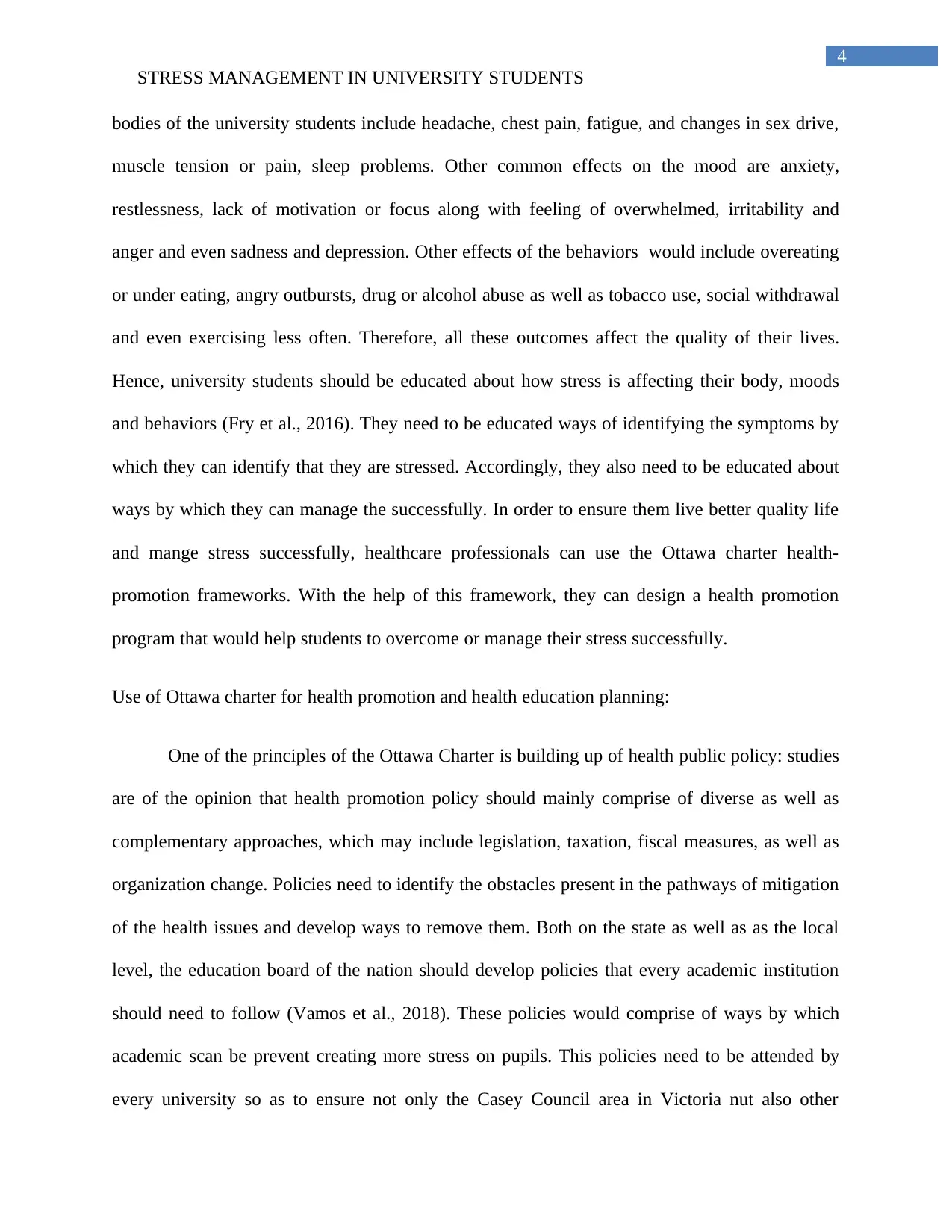
4
STRESS MANAGEMENT IN UNIVERSITY STUDENTS
bodies of the university students include headache, chest pain, fatigue, and changes in sex drive,
muscle tension or pain, sleep problems. Other common effects on the mood are anxiety,
restlessness, lack of motivation or focus along with feeling of overwhelmed, irritability and
anger and even sadness and depression. Other effects of the behaviors would include overeating
or under eating, angry outbursts, drug or alcohol abuse as well as tobacco use, social withdrawal
and even exercising less often. Therefore, all these outcomes affect the quality of their lives.
Hence, university students should be educated about how stress is affecting their body, moods
and behaviors (Fry et al., 2016). They need to be educated ways of identifying the symptoms by
which they can identify that they are stressed. Accordingly, they also need to be educated about
ways by which they can manage the successfully. In order to ensure them live better quality life
and mange stress successfully, healthcare professionals can use the Ottawa charter health-
promotion frameworks. With the help of this framework, they can design a health promotion
program that would help students to overcome or manage their stress successfully.
Use of Ottawa charter for health promotion and health education planning:
One of the principles of the Ottawa Charter is building up of health public policy: studies
are of the opinion that health promotion policy should mainly comprise of diverse as well as
complementary approaches, which may include legislation, taxation, fiscal measures, as well as
organization change. Policies need to identify the obstacles present in the pathways of mitigation
of the health issues and develop ways to remove them. Both on the state as well as as the local
level, the education board of the nation should develop policies that every academic institution
should need to follow (Vamos et al., 2018). These policies would comprise of ways by which
academic scan be prevent creating more stress on pupils. This policies need to be attended by
every university so as to ensure not only the Casey Council area in Victoria nut also other
STRESS MANAGEMENT IN UNIVERSITY STUDENTS
bodies of the university students include headache, chest pain, fatigue, and changes in sex drive,
muscle tension or pain, sleep problems. Other common effects on the mood are anxiety,
restlessness, lack of motivation or focus along with feeling of overwhelmed, irritability and
anger and even sadness and depression. Other effects of the behaviors would include overeating
or under eating, angry outbursts, drug or alcohol abuse as well as tobacco use, social withdrawal
and even exercising less often. Therefore, all these outcomes affect the quality of their lives.
Hence, university students should be educated about how stress is affecting their body, moods
and behaviors (Fry et al., 2016). They need to be educated ways of identifying the symptoms by
which they can identify that they are stressed. Accordingly, they also need to be educated about
ways by which they can manage the successfully. In order to ensure them live better quality life
and mange stress successfully, healthcare professionals can use the Ottawa charter health-
promotion frameworks. With the help of this framework, they can design a health promotion
program that would help students to overcome or manage their stress successfully.
Use of Ottawa charter for health promotion and health education planning:
One of the principles of the Ottawa Charter is building up of health public policy: studies
are of the opinion that health promotion policy should mainly comprise of diverse as well as
complementary approaches, which may include legislation, taxation, fiscal measures, as well as
organization change. Policies need to identify the obstacles present in the pathways of mitigation
of the health issues and develop ways to remove them. Both on the state as well as as the local
level, the education board of the nation should develop policies that every academic institution
should need to follow (Vamos et al., 2018). These policies would comprise of ways by which
academic scan be prevent creating more stress on pupils. This policies need to be attended by
every university so as to ensure not only the Casey Council area in Victoria nut also other
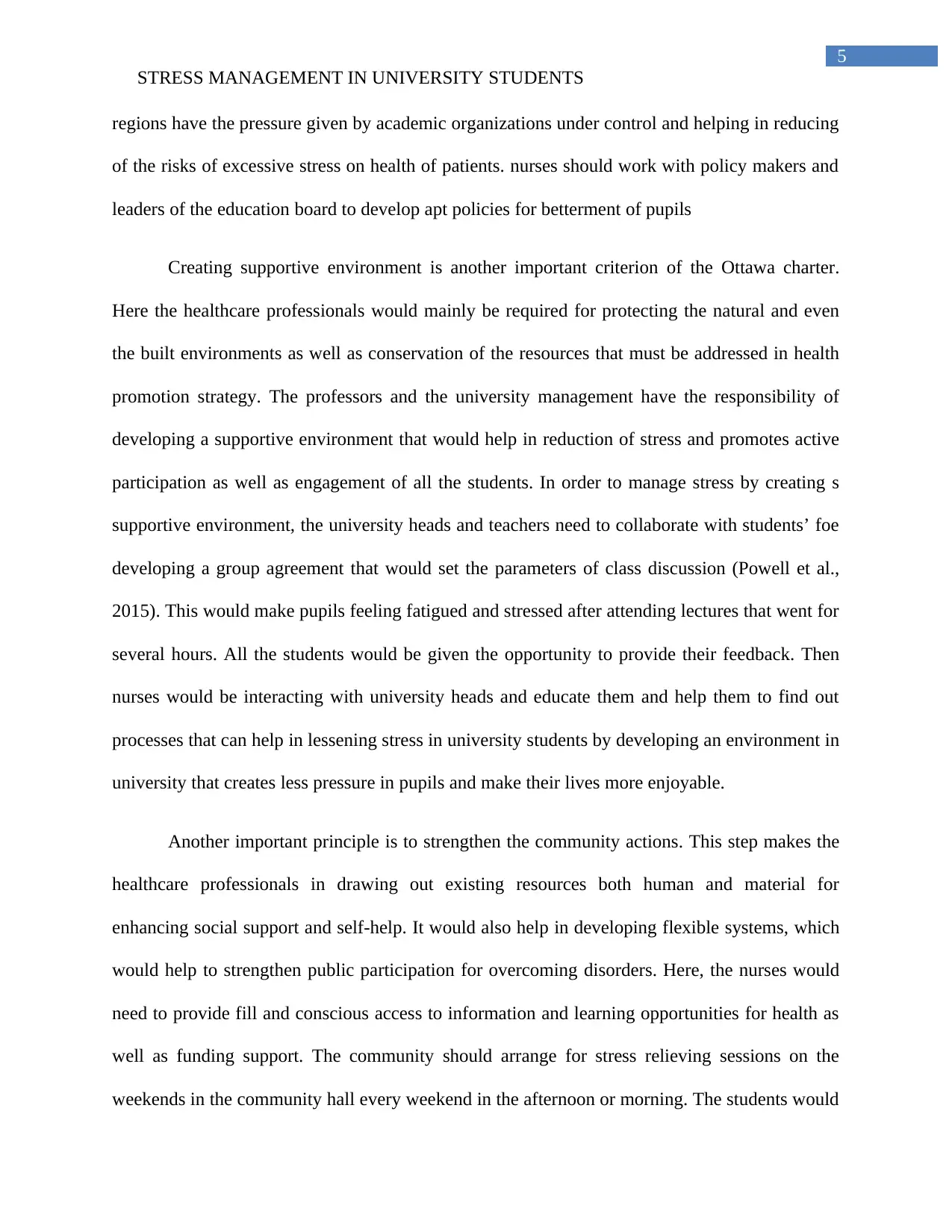
5
STRESS MANAGEMENT IN UNIVERSITY STUDENTS
regions have the pressure given by academic organizations under control and helping in reducing
of the risks of excessive stress on health of patients. nurses should work with policy makers and
leaders of the education board to develop apt policies for betterment of pupils
Creating supportive environment is another important criterion of the Ottawa charter.
Here the healthcare professionals would mainly be required for protecting the natural and even
the built environments as well as conservation of the resources that must be addressed in health
promotion strategy. The professors and the university management have the responsibility of
developing a supportive environment that would help in reduction of stress and promotes active
participation as well as engagement of all the students. In order to manage stress by creating s
supportive environment, the university heads and teachers need to collaborate with students’ foe
developing a group agreement that would set the parameters of class discussion (Powell et al.,
2015). This would make pupils feeling fatigued and stressed after attending lectures that went for
several hours. All the students would be given the opportunity to provide their feedback. Then
nurses would be interacting with university heads and educate them and help them to find out
processes that can help in lessening stress in university students by developing an environment in
university that creates less pressure in pupils and make their lives more enjoyable.
Another important principle is to strengthen the community actions. This step makes the
healthcare professionals in drawing out existing resources both human and material for
enhancing social support and self-help. It would also help in developing flexible systems, which
would help to strengthen public participation for overcoming disorders. Here, the nurses would
need to provide fill and conscious access to information and learning opportunities for health as
well as funding support. The community should arrange for stress relieving sessions on the
weekends in the community hall every weekend in the afternoon or morning. The students would
STRESS MANAGEMENT IN UNIVERSITY STUDENTS
regions have the pressure given by academic organizations under control and helping in reducing
of the risks of excessive stress on health of patients. nurses should work with policy makers and
leaders of the education board to develop apt policies for betterment of pupils
Creating supportive environment is another important criterion of the Ottawa charter.
Here the healthcare professionals would mainly be required for protecting the natural and even
the built environments as well as conservation of the resources that must be addressed in health
promotion strategy. The professors and the university management have the responsibility of
developing a supportive environment that would help in reduction of stress and promotes active
participation as well as engagement of all the students. In order to manage stress by creating s
supportive environment, the university heads and teachers need to collaborate with students’ foe
developing a group agreement that would set the parameters of class discussion (Powell et al.,
2015). This would make pupils feeling fatigued and stressed after attending lectures that went for
several hours. All the students would be given the opportunity to provide their feedback. Then
nurses would be interacting with university heads and educate them and help them to find out
processes that can help in lessening stress in university students by developing an environment in
university that creates less pressure in pupils and make their lives more enjoyable.
Another important principle is to strengthen the community actions. This step makes the
healthcare professionals in drawing out existing resources both human and material for
enhancing social support and self-help. It would also help in developing flexible systems, which
would help to strengthen public participation for overcoming disorders. Here, the nurses would
need to provide fill and conscious access to information and learning opportunities for health as
well as funding support. The community should arrange for stress relieving sessions on the
weekends in the community hall every weekend in the afternoon or morning. The students would
⊘ This is a preview!⊘
Do you want full access?
Subscribe today to unlock all pages.

Trusted by 1+ million students worldwide
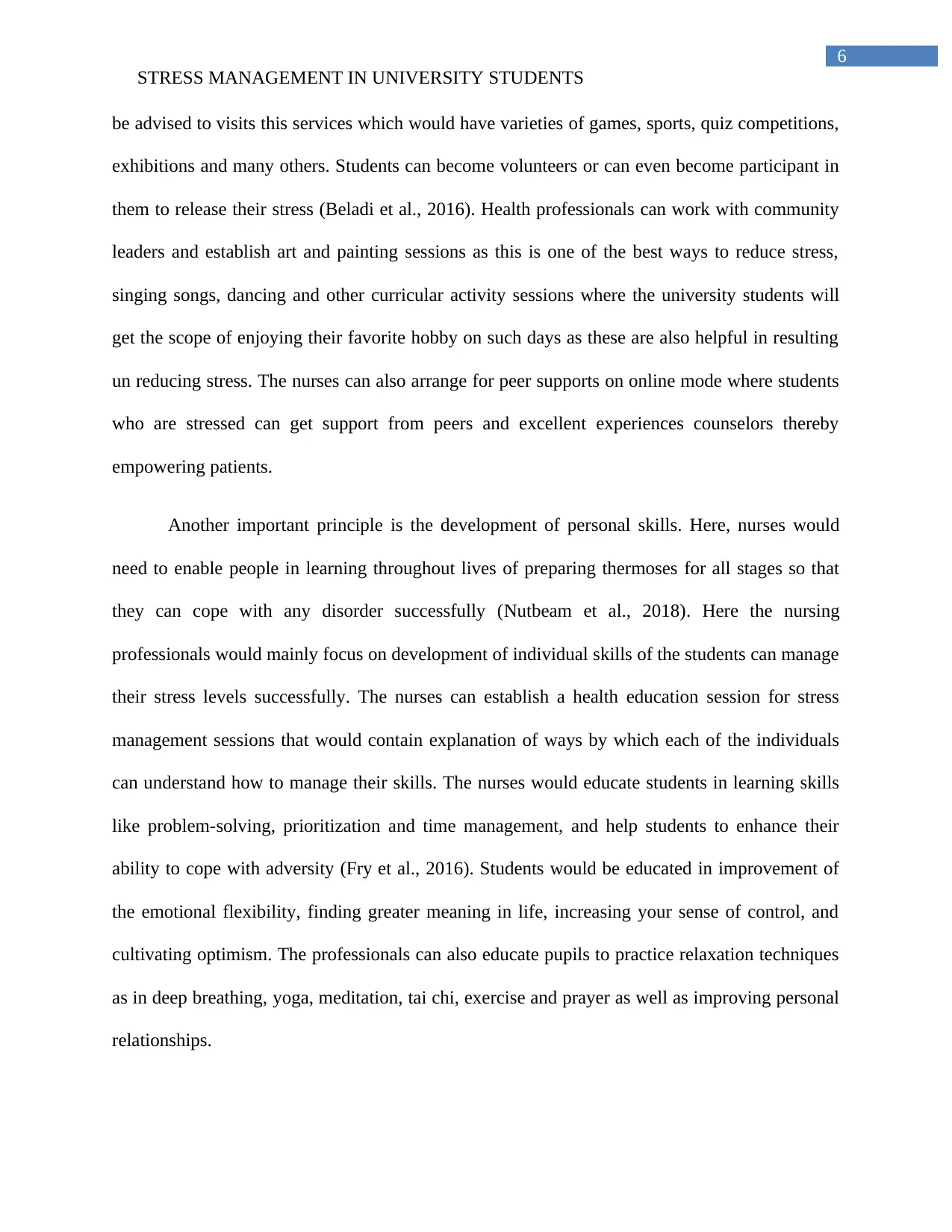
6
STRESS MANAGEMENT IN UNIVERSITY STUDENTS
be advised to visits this services which would have varieties of games, sports, quiz competitions,
exhibitions and many others. Students can become volunteers or can even become participant in
them to release their stress (Beladi et al., 2016). Health professionals can work with community
leaders and establish art and painting sessions as this is one of the best ways to reduce stress,
singing songs, dancing and other curricular activity sessions where the university students will
get the scope of enjoying their favorite hobby on such days as these are also helpful in resulting
un reducing stress. The nurses can also arrange for peer supports on online mode where students
who are stressed can get support from peers and excellent experiences counselors thereby
empowering patients.
Another important principle is the development of personal skills. Here, nurses would
need to enable people in learning throughout lives of preparing thermoses for all stages so that
they can cope with any disorder successfully (Nutbeam et al., 2018). Here the nursing
professionals would mainly focus on development of individual skills of the students can manage
their stress levels successfully. The nurses can establish a health education session for stress
management sessions that would contain explanation of ways by which each of the individuals
can understand how to manage their skills. The nurses would educate students in learning skills
like problem-solving, prioritization and time management, and help students to enhance their
ability to cope with adversity (Fry et al., 2016). Students would be educated in improvement of
the emotional flexibility, finding greater meaning in life, increasing your sense of control, and
cultivating optimism. The professionals can also educate pupils to practice relaxation techniques
as in deep breathing, yoga, meditation, tai chi, exercise and prayer as well as improving personal
relationships.
STRESS MANAGEMENT IN UNIVERSITY STUDENTS
be advised to visits this services which would have varieties of games, sports, quiz competitions,
exhibitions and many others. Students can become volunteers or can even become participant in
them to release their stress (Beladi et al., 2016). Health professionals can work with community
leaders and establish art and painting sessions as this is one of the best ways to reduce stress,
singing songs, dancing and other curricular activity sessions where the university students will
get the scope of enjoying their favorite hobby on such days as these are also helpful in resulting
un reducing stress. The nurses can also arrange for peer supports on online mode where students
who are stressed can get support from peers and excellent experiences counselors thereby
empowering patients.
Another important principle is the development of personal skills. Here, nurses would
need to enable people in learning throughout lives of preparing thermoses for all stages so that
they can cope with any disorder successfully (Nutbeam et al., 2018). Here the nursing
professionals would mainly focus on development of individual skills of the students can manage
their stress levels successfully. The nurses can establish a health education session for stress
management sessions that would contain explanation of ways by which each of the individuals
can understand how to manage their skills. The nurses would educate students in learning skills
like problem-solving, prioritization and time management, and help students to enhance their
ability to cope with adversity (Fry et al., 2016). Students would be educated in improvement of
the emotional flexibility, finding greater meaning in life, increasing your sense of control, and
cultivating optimism. The professionals can also educate pupils to practice relaxation techniques
as in deep breathing, yoga, meditation, tai chi, exercise and prayer as well as improving personal
relationships.
Paraphrase This Document
Need a fresh take? Get an instant paraphrase of this document with our AI Paraphraser
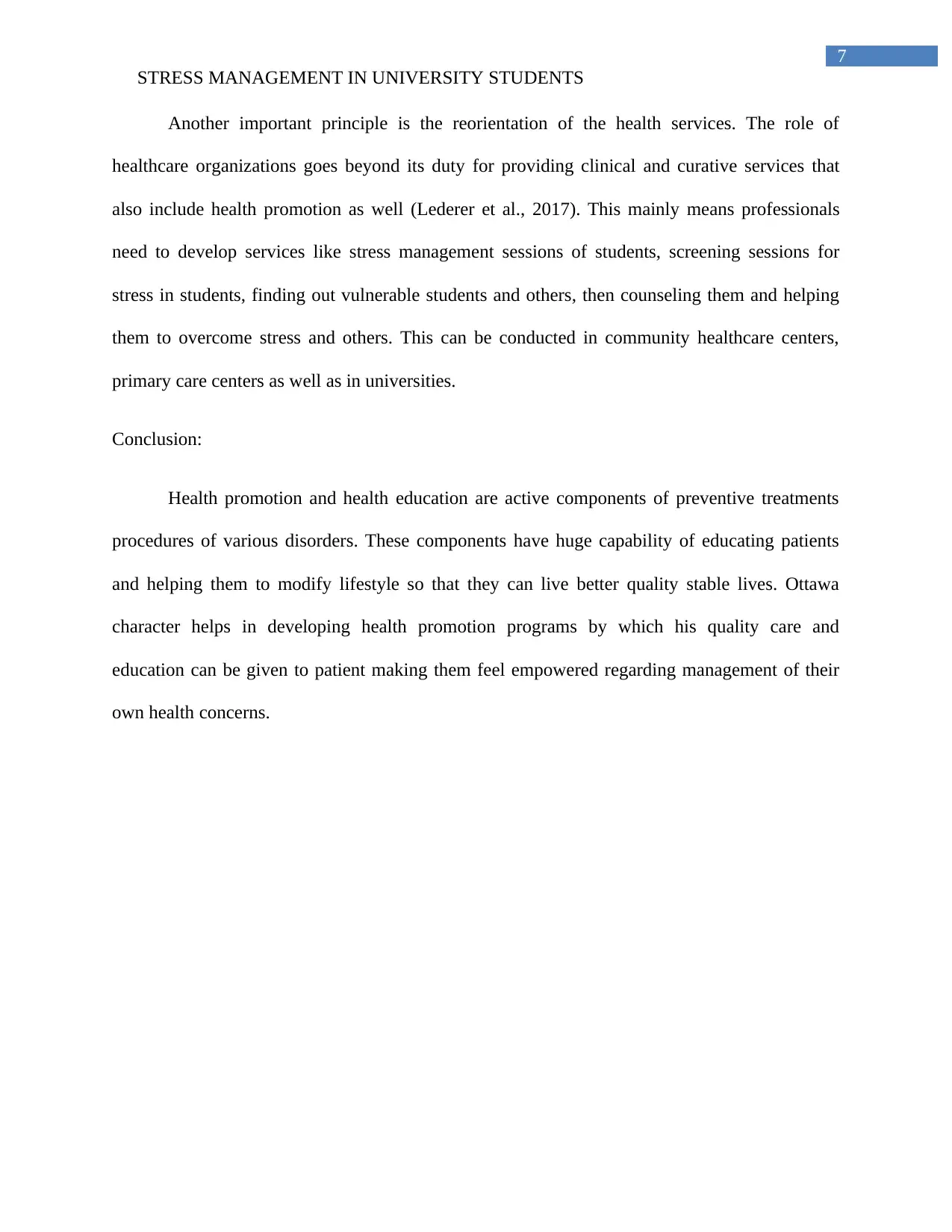
7
STRESS MANAGEMENT IN UNIVERSITY STUDENTS
Another important principle is the reorientation of the health services. The role of
healthcare organizations goes beyond its duty for providing clinical and curative services that
also include health promotion as well (Lederer et al., 2017). This mainly means professionals
need to develop services like stress management sessions of students, screening sessions for
stress in students, finding out vulnerable students and others, then counseling them and helping
them to overcome stress and others. This can be conducted in community healthcare centers,
primary care centers as well as in universities.
Conclusion:
Health promotion and health education are active components of preventive treatments
procedures of various disorders. These components have huge capability of educating patients
and helping them to modify lifestyle so that they can live better quality stable lives. Ottawa
character helps in developing health promotion programs by which his quality care and
education can be given to patient making them feel empowered regarding management of their
own health concerns.
STRESS MANAGEMENT IN UNIVERSITY STUDENTS
Another important principle is the reorientation of the health services. The role of
healthcare organizations goes beyond its duty for providing clinical and curative services that
also include health promotion as well (Lederer et al., 2017). This mainly means professionals
need to develop services like stress management sessions of students, screening sessions for
stress in students, finding out vulnerable students and others, then counseling them and helping
them to overcome stress and others. This can be conducted in community healthcare centers,
primary care centers as well as in universities.
Conclusion:
Health promotion and health education are active components of preventive treatments
procedures of various disorders. These components have huge capability of educating patients
and helping them to modify lifestyle so that they can live better quality stable lives. Ottawa
character helps in developing health promotion programs by which his quality care and
education can be given to patient making them feel empowered regarding management of their
own health concerns.
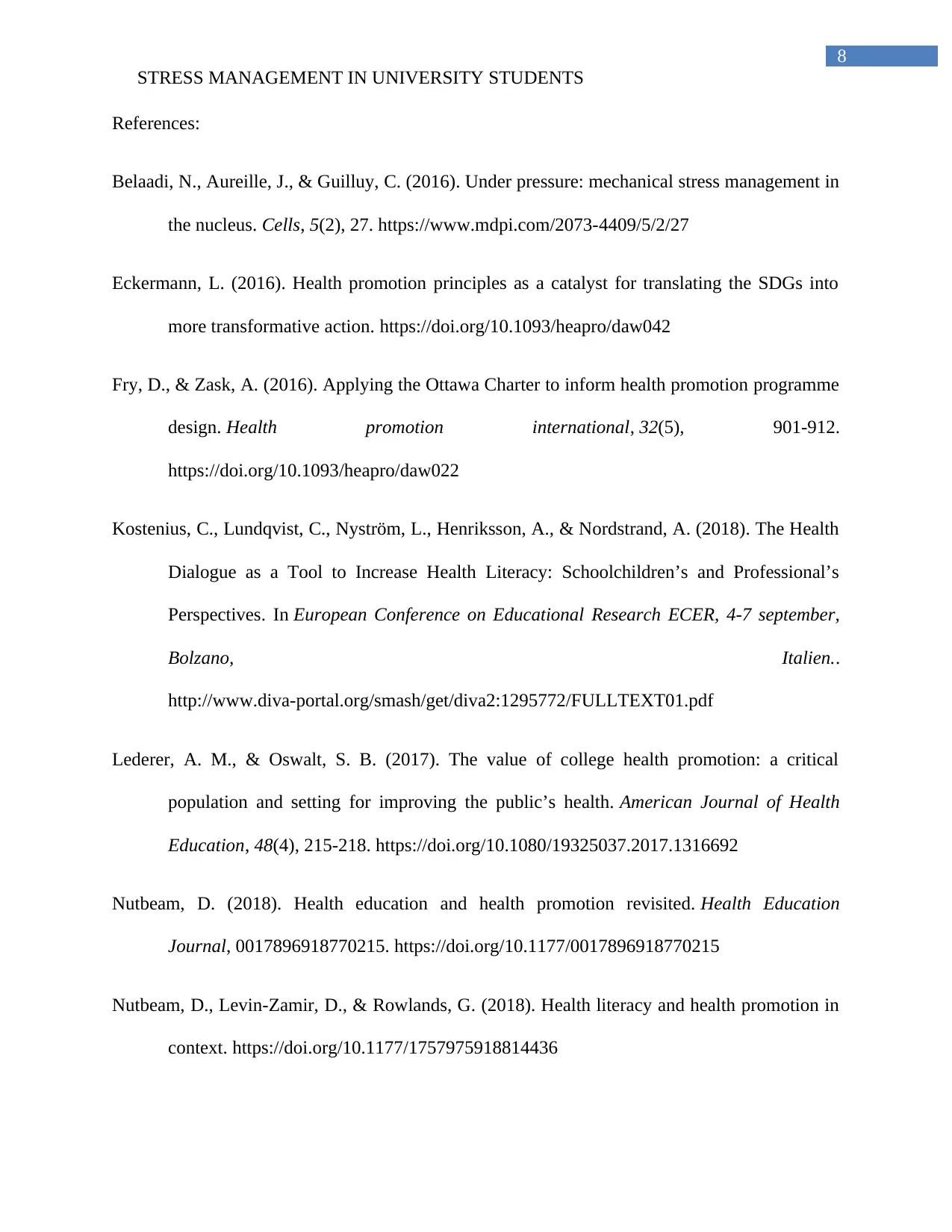
8
STRESS MANAGEMENT IN UNIVERSITY STUDENTS
References:
Belaadi, N., Aureille, J., & Guilluy, C. (2016). Under pressure: mechanical stress management in
the nucleus. Cells, 5(2), 27. https://www.mdpi.com/2073-4409/5/2/27
Eckermann, L. (2016). Health promotion principles as a catalyst for translating the SDGs into
more transformative action. https://doi.org/10.1093/heapro/daw042
Fry, D., & Zask, A. (2016). Applying the Ottawa Charter to inform health promotion programme
design. Health promotion international, 32(5), 901-912.
https://doi.org/10.1093/heapro/daw022
Kostenius, C., Lundqvist, C., Nyström, L., Henriksson, A., & Nordstrand, A. (2018). The Health
Dialogue as a Tool to Increase Health Literacy: Schoolchildren’s and Professional’s
Perspectives. In European Conference on Educational Research ECER, 4-7 september,
Bolzano, Italien..
http://www.diva-portal.org/smash/get/diva2:1295772/FULLTEXT01.pdf
Lederer, A. M., & Oswalt, S. B. (2017). The value of college health promotion: a critical
population and setting for improving the public’s health. American Journal of Health
Education, 48(4), 215-218. https://doi.org/10.1080/19325037.2017.1316692
Nutbeam, D. (2018). Health education and health promotion revisited. Health Education
Journal, 0017896918770215. https://doi.org/10.1177/0017896918770215
Nutbeam, D., Levin-Zamir, D., & Rowlands, G. (2018). Health literacy and health promotion in
context. https://doi.org/10.1177/1757975918814436
STRESS MANAGEMENT IN UNIVERSITY STUDENTS
References:
Belaadi, N., Aureille, J., & Guilluy, C. (2016). Under pressure: mechanical stress management in
the nucleus. Cells, 5(2), 27. https://www.mdpi.com/2073-4409/5/2/27
Eckermann, L. (2016). Health promotion principles as a catalyst for translating the SDGs into
more transformative action. https://doi.org/10.1093/heapro/daw042
Fry, D., & Zask, A. (2016). Applying the Ottawa Charter to inform health promotion programme
design. Health promotion international, 32(5), 901-912.
https://doi.org/10.1093/heapro/daw022
Kostenius, C., Lundqvist, C., Nyström, L., Henriksson, A., & Nordstrand, A. (2018). The Health
Dialogue as a Tool to Increase Health Literacy: Schoolchildren’s and Professional’s
Perspectives. In European Conference on Educational Research ECER, 4-7 september,
Bolzano, Italien..
http://www.diva-portal.org/smash/get/diva2:1295772/FULLTEXT01.pdf
Lederer, A. M., & Oswalt, S. B. (2017). The value of college health promotion: a critical
population and setting for improving the public’s health. American Journal of Health
Education, 48(4), 215-218. https://doi.org/10.1080/19325037.2017.1316692
Nutbeam, D. (2018). Health education and health promotion revisited. Health Education
Journal, 0017896918770215. https://doi.org/10.1177/0017896918770215
Nutbeam, D., Levin-Zamir, D., & Rowlands, G. (2018). Health literacy and health promotion in
context. https://doi.org/10.1177/1757975918814436
⊘ This is a preview!⊘
Do you want full access?
Subscribe today to unlock all pages.

Trusted by 1+ million students worldwide
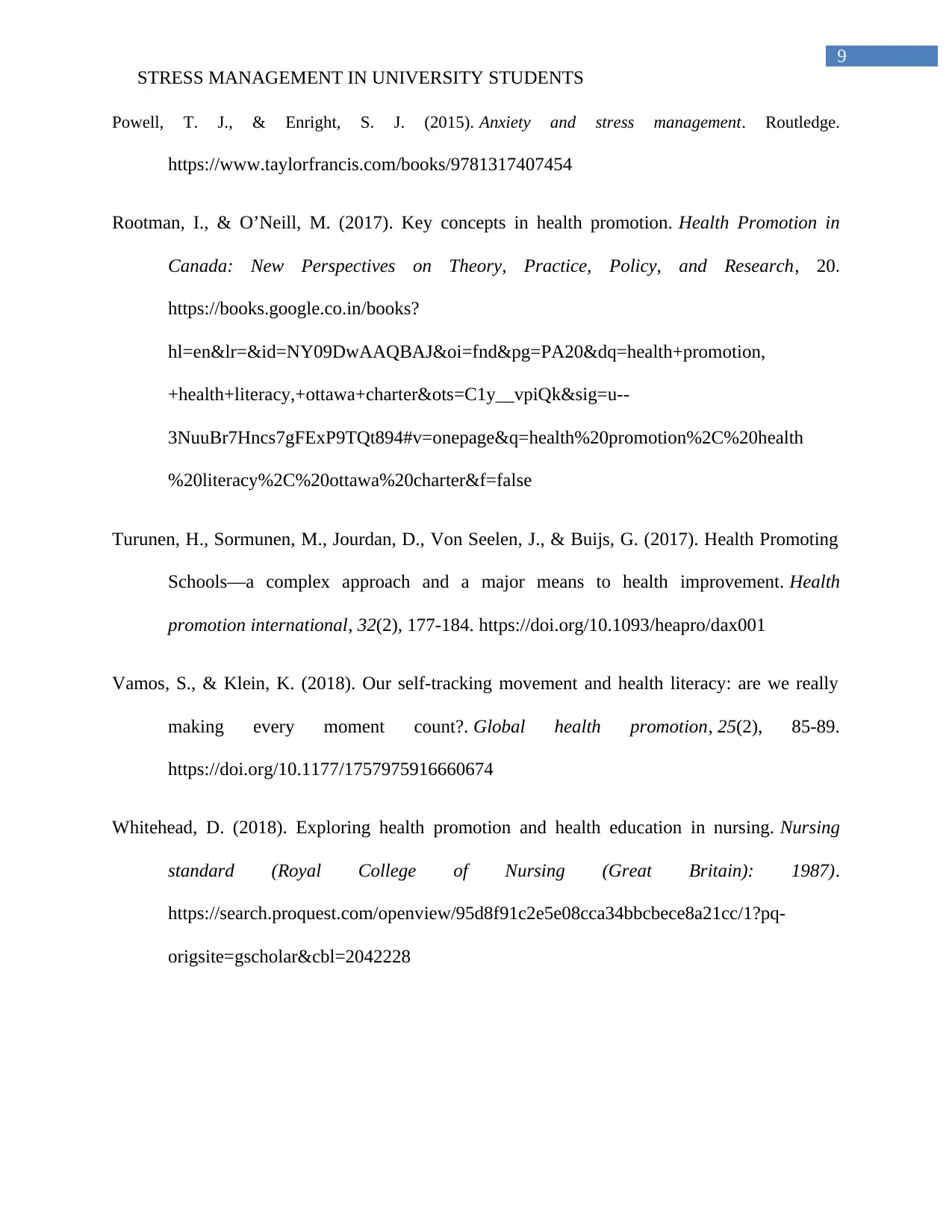
9
STRESS MANAGEMENT IN UNIVERSITY STUDENTS
Powell, T. J., & Enright, S. J. (2015). Anxiety and stress management. Routledge.
https://www.taylorfrancis.com/books/9781317407454
Rootman, I., & O’Neill, M. (2017). Key concepts in health promotion. Health Promotion in
Canada: New Perspectives on Theory, Practice, Policy, and Research, 20.
https://books.google.co.in/books?
hl=en&lr=&id=NY09DwAAQBAJ&oi=fnd&pg=PA20&dq=health+promotion,
+health+literacy,+ottawa+charter&ots=C1y__vpiQk&sig=u--
3NuuBr7Hncs7gFExP9TQt894#v=onepage&q=health%20promotion%2C%20health
%20literacy%2C%20ottawa%20charter&f=false
Turunen, H., Sormunen, M., Jourdan, D., Von Seelen, J., & Buijs, G. (2017). Health Promoting
Schools—a complex approach and a major means to health improvement. Health
promotion international, 32(2), 177-184. https://doi.org/10.1093/heapro/dax001
Vamos, S., & Klein, K. (2018). Our self-tracking movement and health literacy: are we really
making every moment count?. Global health promotion, 25(2), 85-89.
https://doi.org/10.1177/1757975916660674
Whitehead, D. (2018). Exploring health promotion and health education in nursing. Nursing
standard (Royal College of Nursing (Great Britain): 1987).
https://search.proquest.com/openview/95d8f91c2e5e08cca34bbcbece8a21cc/1?pq-
origsite=gscholar&cbl=2042228
STRESS MANAGEMENT IN UNIVERSITY STUDENTS
Powell, T. J., & Enright, S. J. (2015). Anxiety and stress management. Routledge.
https://www.taylorfrancis.com/books/9781317407454
Rootman, I., & O’Neill, M. (2017). Key concepts in health promotion. Health Promotion in
Canada: New Perspectives on Theory, Practice, Policy, and Research, 20.
https://books.google.co.in/books?
hl=en&lr=&id=NY09DwAAQBAJ&oi=fnd&pg=PA20&dq=health+promotion,
+health+literacy,+ottawa+charter&ots=C1y__vpiQk&sig=u--
3NuuBr7Hncs7gFExP9TQt894#v=onepage&q=health%20promotion%2C%20health
%20literacy%2C%20ottawa%20charter&f=false
Turunen, H., Sormunen, M., Jourdan, D., Von Seelen, J., & Buijs, G. (2017). Health Promoting
Schools—a complex approach and a major means to health improvement. Health
promotion international, 32(2), 177-184. https://doi.org/10.1093/heapro/dax001
Vamos, S., & Klein, K. (2018). Our self-tracking movement and health literacy: are we really
making every moment count?. Global health promotion, 25(2), 85-89.
https://doi.org/10.1177/1757975916660674
Whitehead, D. (2018). Exploring health promotion and health education in nursing. Nursing
standard (Royal College of Nursing (Great Britain): 1987).
https://search.proquest.com/openview/95d8f91c2e5e08cca34bbcbece8a21cc/1?pq-
origsite=gscholar&cbl=2042228
1 out of 10
Related Documents
Your All-in-One AI-Powered Toolkit for Academic Success.
+13062052269
info@desklib.com
Available 24*7 on WhatsApp / Email
![[object Object]](/_next/static/media/star-bottom.7253800d.svg)
Unlock your academic potential
Copyright © 2020–2025 A2Z Services. All Rights Reserved. Developed and managed by ZUCOL.





